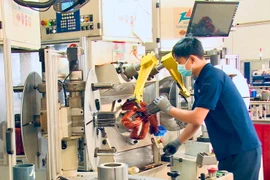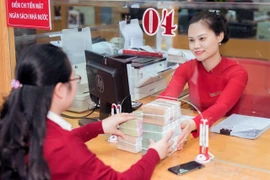Bac Ninh (VNA) - As Vietnam’s economy continues its shift toward global integration, the northern province of Bac Ninh is actively implementing Resolution 68-NQ/TW, issued on May 4, 2025 by the Party Central Committee, to support private-sector growth through translating policy into practical outcomes, generating real opportunities for enterprises to thrive and contribute to the locality’s prosperity.
Driving digital transformation in business sector
In recent years, Bac Ninh’s private enterprises have embraced innovation and integrated advanced technologies into production processes, supported by national and local initiatives aimed at accelerating private-sector development.
AMA Holdings Investment JSC, located in Yen Phong Industrial Park and specialising in supporting industries and precision engineering, has implemented smart manufacturing solutions with support from the Ministry of Industry and Trade, Bac Ninh People’s Committee, and Samsung Electronics Vietnam.
Nguyen Dinh Than, Director of the factory, said that prior to adopting smart manufacturing, tasks such as inventory checks, data recording, and product separation were handled manually, which caused inefficiencies and errors. With the smart factory model in place, workflows have been streamlined, automation increased, and production efficiency improved 30%.
Thang Long Packaging Import-Export and Production JSC, based in Tu Son city, has also seen results from the smart factory programme. Previously, the company dealt with decentralised and slow data systems that hampered decision-making. Since revamping its management systems, it has achieved continuous data flow, which has played a key role in winning new contracts both in Vietnam and abroad.
Do Thi Phuong Lien, Deputy General Director of the firm, stated that the model brought rapid and visible improvements. She added that timely and accurate internal reporting had strengthened management, increased productivity, and boosted competitiveness, and that the company planned to implement the system across its entire operation.
Innotek JSC, located in Que Vo II Industrial Park and focused on precision engineering, has also made significant progress thanks to provincial support for smart factory adoption. Its strategy to become a green, tech-driven business has helped it access high-standard markets such as Japan and the EU.
However, Nguyen Thi Nhan, the company’s General Director, stressed that for Vietnamese firms to remain globally competitive, stronger policy support was essential—especially in taxation and the training of skilled technical workers.
Strategic priority for private enterprise
As of 2024, Bac Ninh had more than 24,800 businesses with total registered capital of approximately 430.45 trillion VND (16.5 billion USD). Between 2020 and 2024, the province counted nearly 3,000 new business registrations per year—2.5 times the national average. There are now 16 businesses per 1,000 residents, with the number expected to rise to 28 per 1,000 by 2030. Even accounting for inactive or dissolved firms, the ratio is projected to remain at 26 per 1,000, exceeding the 20 per 1,000 target outlined in Resolution 68-NQ/TW.
Vuong Quoc Tuan, Chairman of the Bac Ninh People’s Committee, affirmed the province’s commitment to viewing the private sector, particularly in science and technology, as a key engine of innovation, high-tech adoption, and sustainable value creation. He noted that efforts will continue to improve the regulatory framework, enhance the business environment, and support start-ups, high-tech ventures, and private firms.
Ongoing programmes to promote technology transfer, finance access, and workforce development are yielding positive results and forming the foundation of a local innovation ecosystem.
A flagship initiative is the tripartite partnership between Bac Ninh, the Ministry of Industry and Trade, and Samsung, designed to support Vietnamese businesses in the province. Bac Ninh also led the country in allocating 1 trillion VND to train high-quality talent for the semiconductor industry, while also building research centres and attracting top universities.
The private sector in Bac Ninh has expanded significantly in areas related to science and technology. Many companies are now investing in research and development (R&D) and embracing cutting-edge technologies such as artificial intelligence (AI), biotechnology, automation, and digital transformation—contributing to greater productivity and the development of a knowledge-based economy.
In May 2025, the province established five liaison committees for science and technology business associations. Tuan described this as a vital move toward building a comprehensive innovation ecosystem, where businesses can connect, share expertise, and collaborate for mutual growth.
These committees are expected to bridge the gap between government, businesses, and researchers—strengthening industry associations and promoting a culture of innovation within the business community.
To further strengthen private-sector innovation, Bac Ninh plans to accelerate administrative reforms, build a digital, service-oriented government, and develop an integrated innovation ecosystem that connects businesses with domestic and international institutions, universities, and experts.
The province is also working to improve access to technology, finance, infrastructure, and skilled human resources, positioning itself as a new growth hub based on science, innovation, digital transformation, and green development.
All industrial zone developers are now required to allocate 15–20% of land for domestic private technology enterprises.
Tuan concluded that the province is fully committed to supporting its enterprises. He emphasised that businesses are seen as central partners in Bac Ninh’s path to global integration and sustainable growth. He expressed confidence that private science and technology firms would continue to lead with innovation, invest in R&D, and build competitive brands that can move from local markets to the global stage, helping the province achieve its development goals in the new era./.
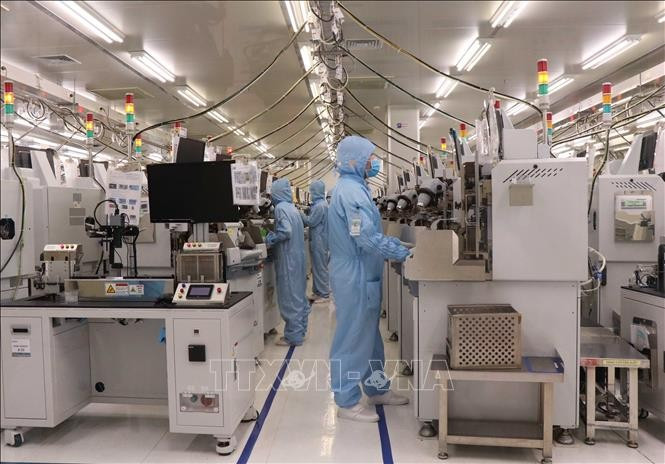
See more
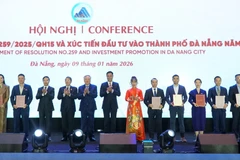
Da Nang continues targeted investment promotion approaches
According to Chairman of the Da Nang People’s Committee Pham Duc An, the city prioritises building sustainable economic ecosystems and focuses on key breakthrough sectors with strong spillover effects, including high technology and digital transformation, logistics, urban infrastructure, finance, processing and manufacturing industries, high-tech agriculture, and the pharmaceutical and medicinal herb industry.
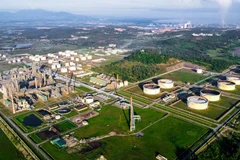
📝OP-ED: Resolution 79 – Launchpad for national aspirations
Resolution 79 is not only about SOEs. At a deeper level, it is about how Vietnam reorganises its development drivers in a world that is changing at breakneck speed.
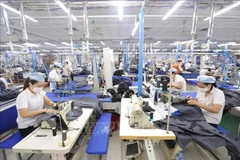
UOB raises Vietnam’s 2026 GDP growth forecast to 7.5%
In 2025, Vietnam’s GDP grew by 8%, beating UOB’s forecast of 7.7% but still falling short of the Government’s target of 8.3–8.5%, which would have needed an extraordinary boost in the final quarter.

Reference exchange rate up 4 VND on January 10
With the current trading band of +/- 5%, the ceiling rate applicable for commercial banks during the day is 26,388 VND/USD, and the floor rate 23,874 VND/USD.

Infrastructure key to unlocking tourism’s role in double-digit growth target
With transport links running smoothly, urban infrastructure upgraded and digital platforms built out in a more systematic way, tourism would move beyond a purely consumption-driven sector to become a deeper, more durable engine of growth.

Hyundai sales in Vietnam rise almost 23% in December
In 2025, sales reached 53,229 vehicles across the market, a result considered a testament to the efforts by TC Group, Hyundai Thanh Cong, and the entire Hyundai dealership network nationwide amidst a volatile market.

Da Nang approves plan key infrastructure developers at FTZ
The Da Nang FTZ is expected to contribute 17.9% to the city’s gross regional domestic product and create 127,000 jobs by 2040, with total investment needs estimated at 40 trillion VND (1.6 billion USD).

HCM City accelerates shift toward ecological urban agriculture
The city’s agricultural sector is undergoing a strong transformation, restructuring toward higher value-added and sustainable development. In recent years, the sector has maintained steady growth, with agricultural, forestry and fisheries output rising by an estimated 2.5% annually.
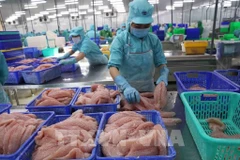
Vietnam records biggest trade surplus with Netherlands among European partners
Vietnam’s exports to the Netherlands totalled 13.5 billion USD last year, up 3.7% compared to 2024, while imports stood at 825 million USD, rising 5.2%.
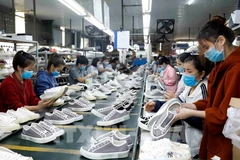
Footwear-leather industry seeks new drivers to sustain growth
Vietnam currently ranks third globally in footwear production, with around 1.4 billion pairs manufactured annually, behind China and India, and second in exports with approximately 1.3 billion pairs a year.
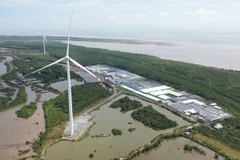
Sunpro - Ben Tre wind power plant becomes operational in Vinh Long
The plant features seven turbines and has a total investment of about 1.6 trillion VND (60.9 million USD), expected to generate 89.5 GWh per year, enough to supply electricity for about 27,000 households.
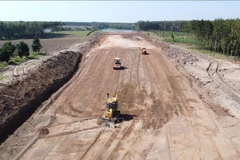
Dong Nai to launch major projects ahead of 14th National Party Congress
The launch of work on these projects represents an important political event for the province as they demonstrate the strong commitment of the entire political system to developing a comprehensive and modern infrastructure network, enhancing inter-regional connectivity, and addressing social welfare needs.
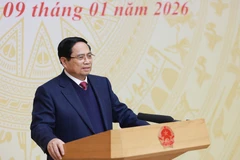
PM orders sharp cut in State-funded projects, caps 2026–2030 total at 3,000
For 2026, the Government has allocated nearly 995.35 trillion VND in state budget investment, with about 85.6% already assigned as of January 7.
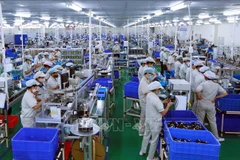
Lam Dong ready for nationwide economic census 2026
The entire process needs to reassure respondents that statistical activities operate independently, information is protected under the Statistics Law, and all data collection is completely separate from tax management.

Prudential plc CEO reinforces long-term commitment to Vietnam during market visit
Prudential has been operating in Vietnam for more than 26 years, having been the first foreign insurer to establish a representative office in the country in 1999.
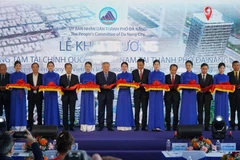
Vietnam launches International Financial Centre in Da Nang
The Government has clearly defined the development orientation of the International Financial Centre in Da Nang as a modern international financial hub closely linked with the innovation ecosystem, digital technology, and sustainable finance.
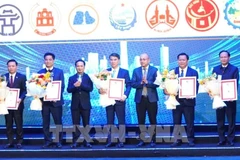
Tay Ninh named among top 10 most attractive localities for large enterprises for second consecutive year
In 2025, Tay Ninh’s economy maintained strong growth momentum, with gross regional domestic product (GRDP) expanding by 9.52%, ranking eighth among 34 provinces and cities nationwide.

Lam Dong steps up oversight to curb IUU fishing
As of early January 2026, the province had 8,210 registered fishing vessels, with more than 90% holding valid fishing licences, according to the department. A total of 8,115 vessels, or 98.76%, have been updated in the National Population Database, while 1,773 out of 1,941 vessels measuring 15 metres or longer have been granted food safety certificates, accounting for 91.34%.

People’s legitimate rights, interests must never be overlooked in public investment: PM
The Prime Minister underlined that public investment has consistently been identified as a key political task, with public investment disbursement results serving as one of the criteria for evaluating officials under Party regulations. Through state spending, public investment directly boosts aggregate demand and serves as an effective tool for regulating and stabilising the macroeconomy while safeguarding major economic balances.
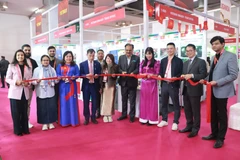
Vietnamese agricultural, food products draw attention at Asia’s leading tradeshow
For Vietnamese companies, Indusfood 2026 offers direct access to global buyers, opportunities to connect with distribution partners, insights into emerging consumer trends, and engagement in thematic events on investment, logistics, digital transformation, artificial intelligence and innovation in the food industry.
